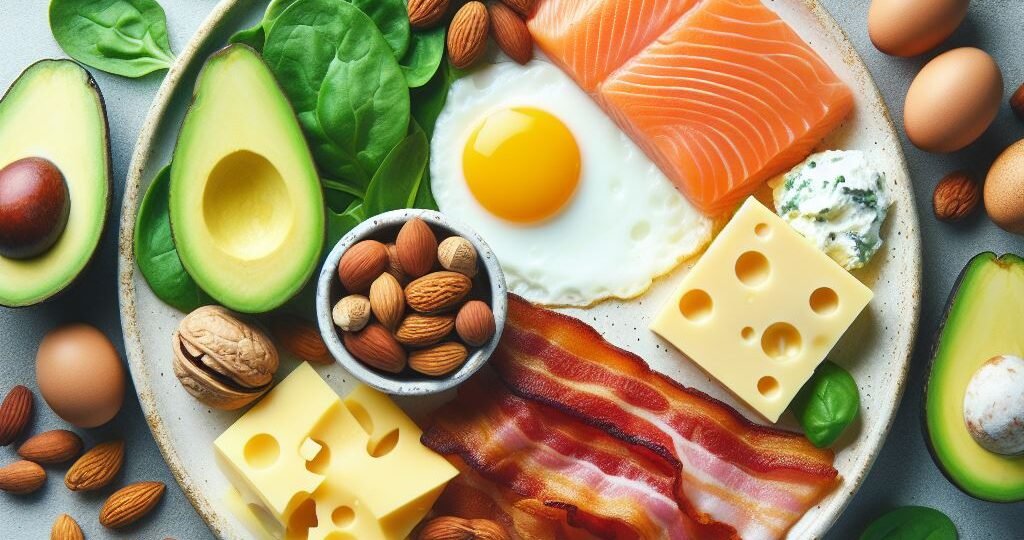
Are you ready to embark on a life-changing journey with the ketogenic diet? But hold on, what should you expect during the crucial first week? How can you ensure a smooth adaptation to this low-carb, high-fat lifestyle? Let’s explore the secrets to a successful keto transition.
Key Takeaways:
- Consult a professional dietician before starting a keto diet for personalized guidance.
- Focus on reducing carbohydrate intake and increasing fat and protein consumption.
- Incorporate keto-friendly foods while avoiding high-carb items.
- Stay hydrated and opt for keto-friendly beverages.
- Replace processed foods with whole foods in your pantry.
Understanding the Keto Adaptation Process
The primary goal of a keto diet is to reduce carbohydrate intake and rely on fats as the main energy source instead of glucose. This metabolic state is known as ketosis. During the first week, the body transitions from using glucose for energy to burning fats for fuel. This process may cause temporary symptoms like headaches, fatigue, muscle aches, nausea, brain fog, and irritability, commonly referred to as the “carb flu.” It is important to be gentle with yourself during this transition and rest as needed.
By day 4, the body starts adapting to using fats for fuel, and symptoms may start to improve. By the end of the first week, many individuals experience increased energy levels and a steady feeling of fullness.
Transitioning to Ketosis: Understanding the Process
When you embark on a keto diet, your body undergoes a remarkable transformation. Instead of relying on carbohydrates for energy, it begins to burn fats for fuel, entering a metabolic state called ketosis. This shift requires some adjustment, as your body transitions from using glucose to efficiently burning fats for energy.
During the first week, your body may experience some temporary symptoms known as the “carb flu.” These can include headaches, fatigue, muscle aches, nausea, brain fog, and irritability. It’s important to remember that these symptoms are a natural part of the adaptation process and will usually subside as your body becomes more efficient at using fats for fuel.
By day 4, the adaptation process is well underway, and many individuals begin to notice improvements in their symptoms. Energy levels often increase, and a feeling of fullness becomes more consistent. By the end of the first week, you may find that you have adapted to the keto diet and are experiencing the benefits of ketosis.
Initial Weight Loss on the Keto Diet
When starting the keto diet, you may notice an initial drop in weight. This is often attributed to the loss of water weight. Let’s explore why this happens and what it means for your weight loss journey on the keto diet.
As your body enters ketosis, it starts burning through its glycogen stores, which are bound to water molecules. This increased burning of glycogen results in a higher frequency of urination, leading to a temporary decrease in water weight.
The amount of initial weight loss can vary from person to person. Generally, larger individuals tend to experience more significant water weight losses due to their higher glycogen stores. It’s important to note that water weight loss is a normal part of the initial phase of the keto diet and should not be confused with fat loss.
As your body fully adapts to ketosis, it becomes more efficient at burning stored body fat for fuel, leading to further weight loss. This is where the real fat loss happens. However, it’s essential to remember that weight loss on the keto diet can vary depending on various factors such as metabolism, body composition, and adherence to the diet.
As you can see, initial weight loss primarily consists of water weight, while fat loss occurs as your body becomes adapted to ketosis. It’s essential to stay patient and focus on the long-term benefits of the keto diet. Remember, sustained fat loss occurs over time with consistent adherence to the diet and lifestyle changes.
Now that you understand the initial weight loss on the keto diet, let’s explore the timeline of keto adaptation and what to expect in the upcoming section.
Timeline of Keto Adaptation
The timeline for keto adaptation varies from person to person. Each individual’s journey into ketosis is unique, but there are general patterns that can be observed.
On the first day, many individuals may find it challenging to adjust their macronutrient ratios. Reaching the target of consuming 75% of calories from fat can be a significant change for those accustomed to a higher carbohydrate diet.
By the second day, symptoms of the “carb flu” may start to appear. These symptoms can include headaches, fatigue, and irritability as the body adjusts to the absence of carbohydrates.
Day 3 is often reported as the most challenging day in terms of carb flu symptoms. Individuals may experience heightened cravings for carbohydrates and may still struggle with fatigue and brain fog.
However, by day 4, there is usually a significant improvement. Carb flu symptoms start to diminish, and individuals may begin to feel more comfortable with the keto diet.
By the end of the first week, many individuals hit their stride and experience increased energy levels and a decreased appetite. These signs indicate that the body is adapting to using fats for fuel, a state known as ketosis.
Tips for a Successful First Week on Keto
Embarking on the keto diet can be an exciting and transformative journey. The first week is crucial for setting a strong foundation for long-term success. Here are some tips to ensure a smooth and successful start:
Choose the Right Day to Begin
Starting the keto diet on a day that allows for extra rest and self-care can make a significant difference. Consider beginning on a Thursday, as this will help navigate through the toughest days of carb flu, which tend to fall on the weekend.
Prioritize Rest and Hydration
During the first week, it is important to give your body the rest it needs to adapt to the new dietary changes. Aim for a minimum of 7-8 hours of quality sleep each night. Additionally, staying hydrated is crucial to support your body’s transition into ketosis. Make sure to drink plenty of water throughout the day.
Engage in Minimal Physical Activity
While regular exercise is important for overall health, it’s recommended to keep physical activity to a minimum during the first week of keto adaptation. Intense workouts may put stress on your body while it adjusts to burning fats for fuel. Incorporate gentle activities like walking or yoga to support the adaptation process.
Meal Prep for Success
Meal prepping is a valuable tool for staying on track with the keto diet, especially during the first week. Planning and preparing your meals in advance ensures that you have keto-friendly options readily available and reduces the chances of making impulsive food choices. Territory’s Keto meals offer chef-prepared, nutritionist-approved options that make meal prep effortless.
Stay Positive and Mindful
Adjusting to a new eating style can be challenging, but maintaining a positive mindset is crucial. Stay focused on your goals and remind yourself of the numerous health benefits that the keto diet offers. Practicing mindfulness can also help you make intentional food choices and manage cravings effectively.
Listen to Your Body
Every individual’s keto journey is unique, and it’s essential to listen to your body’s signals. Pay attention to how specific foods and meal timings affect your energy levels, hunger, and overall well-being. Adjust your diet accordingly to optimize your keto experience.
By following these tips, you can ensure a successful first week on the keto diet. Remember, patience and consistency are key as your body adapts to the metabolic changes. Embrace this new lifestyle with excitement and confidence, and you’ll be on your way to achieving your health and wellness goals.
Progressing beyond the First Week
By the start of the second week, many individuals would have entered ketosis, experiencing increased energy levels and reduced carb flu symptoms. The majority of people achieve ketosis within 10 days of starting the keto diet. As the body becomes adapted to burning fat for fuel, it is common to notice improvements in energy, reduced hunger, and better blood sugar control. Continued adherence to the keto diet can lead to sustained fat burning, weight loss, and other potential health benefits. It is important to monitor ketone levels and ensure adequate water intake to prevent dehydration.
Maintaining Ketosis
To continue progressing on the ketogenic diet and maintain ketosis, it’s essential to focus on keeping carbohydrate intake low and maintaining a high fat and moderate protein intake. Here are some tips to help you stay on track:
- Avoid high-carb foods such as grains, starchy vegetables, and sugary treats.
- Incorporate healthy fats from sources like avocados, olive oil, and nuts.
- Include protein from quality sources such as lean meat, poultry, fish, and eggs.
- Eat plenty of non-starchy vegetables to ensure you’re getting essential vitamins and minerals.
- Stay hydrated by drinking water throughout the day.
By following these guidelines and making healthy food choices, you can continue to enjoy the benefits of ketosis and sustained fat burning.
| Benefits of Progressing on Keto | How to Maintain Ketosis |
|---|---|
| Increased energy levels | Avoid high-carb foods |
| Reduced hunger | Incorporate healthy fats |
| Better blood sugar control | Include quality protein sources |
| Sustained fat burning | Eat non-starchy vegetables |
Benefits of Keto Adaptation
Keto adaptation offers several benefits beyond weight loss. The transition to using fats for fuel can lead to increased energy levels throughout the day, eliminating the mid-afternoon slump often associated with fluctuations in blood sugar levels. By limiting carbohydrate intake, the keto diet promotes stable blood sugar levels and may improve insulin sensitivity, which is beneficial for individuals with diabetes or metabolic disorders.
One of the key advantages of keto adaptation is its effect on appetite control. The high-fat content of the diet provides a feeling of fullness on fewer calories, reducing the likelihood of overeating. This can be particularly helpful for individuals looking to lose weight or maintain a healthy weight.
Furthermore, emerging research suggests that the keto diet may have neuroprotective and anti-inflammatory effects. These potential benefits could positively impact brain health and reduce inflammation throughout the body. While more research is needed in this area, the early findings are promising.
Increased Energy Levels
By using fats as the primary source of fuel, the body can maintain a steady supply of energy without relying on frequent carbohydrate intake. This can lead to sustained energy levels throughout the day, reducing feelings of fatigue and enhancing overall productivity and performance.
Improved Blood Sugar Control
The keto diet’s low-carbohydrate nature helps stabilize blood sugar levels and reduces the need for insulin spikes. This can be beneficial for individuals with diabetes or those who struggle with insulin resistance. Stable blood sugar levels can also prevent energy crashes and sugar cravings, supporting weight management efforts.
Appetite Control
The high-fat content of the keto diet helps promote satiety and reduce hunger cravings. This can prevent overeating and make it easier to adhere to a calorie-controlled diet. Feeling satisfied on fewer calories can be instrumental in achieving weight loss goals and maintaining a healthy weight.
Neuroprotective and Anti-inflammatory Effects
While further research is needed, preliminary studies suggest that the keto diet may have neuroprotective and anti-inflammatory effects. These potential benefits could be helpful in protecting brain health and reducing inflammation-related conditions.
Overall, keto adaptation offers numerous benefits beyond weight loss. The increased energy levels, improved blood sugar control, appetite control, and potential neuroprotective and anti-inflammatory effects make the keto diet an intriguing option for individuals looking to improve their health and overall well-being.
Long-Term Strategies for Keto Success
To achieve long-term success with the keto diet, it is important to maintain a balanced and sustainable approach. Here are some strategies to help you stay on track:
- Focus on Variety: Incorporate a wide range of nutrient-dense foods to ensure you are getting all the essential nutrients your body needs. Include plenty of non-starchy vegetables, high-quality proteins, healthy fats, and fiber-rich sources.
- Experiment with Recipes: Keep your meals interesting and enjoyable by trying out different keto-friendly recipes and meal ideas. This will help prevent boredom and ensure that you are getting a good variety of flavors and textures in your diet.
- Seek Professional Guidance: Consider working with a registered dietitian or nutritionist who specializes in the ketogenic diet. They can provide personalized guidance and ensure that you are meeting your nutritional needs while staying in ketosis.
“A varied and balanced diet is key to long-term success on the keto diet. By incorporating a wide range of foods and seeking professional guidance, you can ensure that you are getting all the necessary nutrients while enjoying sustainable and delicious meals.” – Jen Smith, Registered Dietitian
Remember, long-term success on the keto diet is about finding a sustainable approach that works for you. By incorporating varied food options, seeking professional support, and maintaining a balanced eating plan, you can achieve your health and weight loss goals while enjoying the benefits of the keto lifestyle.
| Benefits of Long-Term Keto Success |
|---|
| Steady weight loss |
| Improved energy levels |
| Enhanced mental focus |
| Reduced inflammation |
| Better blood sugar control |

Staying Motivated on the Keto Journey
The keto journey can sometimes be challenging, especially in the initial stages. But with the right strategies, you can stay motivated and achieve your goals. Here are some tips to help you stay on track:
- Set specific goals: Define what you want to achieve with your keto journey. Whether it’s weight loss, improved health markers, or increased energy, having clear goals can keep you motivated.
- Track your progress: Keep a journal or use a food tracking app to monitor your daily intake and progress. Seeing your accomplishments and how far you’ve come can be a powerful motivator.
- Celebrate non-scale victories: Don’t just focus on the number on the scale. Celebrate non-scale victories like increased energy, improved mental clarity, and better sleep. These small wins can boost your motivation.
- Build a support network: Surround yourself with friends, family, or online communities who follow the keto diet. Connecting with others who share your journey can provide encouragement, tips, and accountability.
“Sharing experiences, challenges, and successes can provide encouragement and help you stay accountable.”
Remember that everyone’s journey is unique, and progress may not always be linear. There will be ups and downs, but staying focused on the long-term benefits and the positive impact the keto diet can have on your health and well-being will keep you motivated to continue.
| Benefits of Staying Motivated |
|---|
| Increased adherence to the keto diet |
| Consistent progress towards goals |
| Positive impact on overall health and well-being |
| Motivation to overcome challenges |
By staying motivated on your keto journey, you can overcome obstacles, achieve your goals, and enjoy the many benefits of the ketogenic lifestyle.
Conclusion
Embarking on the first week of the ketogenic diet requires careful attention to carbohydrate intake and a focus on increasing fat and protein consumption. Keto adaptation involves transitioning the body from using glucose to burning fats for fuel, resulting in weight loss and improved health markers.
The initial week may be challenging due to carb flu symptoms, but with perseverance, these symptoms subside, and individuals experience increased energy levels and appetite control. While initial weight loss may be attributed to water weight, sustained fat burning occurs once the body fully adapts to ketosis.
Progressing beyond the first week requires continued adherence to the diet and monitoring of ketone levels. The keto diet offers numerous benefits, including increased energy, stable blood sugar levels, and potential neuroprotective and anti-inflammatory effects.
Long-term success entails maintaining a varied and balanced approach to food choices while seeking support from professionals and like-minded individuals. Stay motivated on your keto journey by setting goals, celebrating non-scale victories, and leaning on your support network. Remember, the keto diet is a long-term lifestyle change that has the potential to positively impact your overall well-being.
FAQ
What is the ketogenic diet?
The ketogenic diet is a strict, low-carb, moderate-protein, and high-fat diet plan that aids in weight loss and improves overall health.
How many carbohydrates should I consume in the first week of the keto diet?
It is important to consume less than 50 grams of carbohydrates per day in the first week.
Do I need to consult with a professional dietician before starting a keto diet?
Yes, consultation with a professional dietician before starting a keto diet is recommended.
Which foods should I focus on when following the keto diet?
Focus on curbing carbohydrate intake and increasing fat and protein consumption. Incorporate keto-friendly foods such as avocados, non-starchy vegetables, meat, fatty fish, poultry, eggs, full-fat dairy, cheese, healthy oils, nuts, seeds, and low glycemic fruits.
What foods should I avoid on the keto diet?
Avoid baked items, sugary foods, pasta, grains, starchy items, legumes, high-sugar fruits, sugary beverages, alcoholic beverages, and carb-rich sauces.
What are some keto-friendly beverages?
Opt for keto-friendly beverages like water, sparkling water, unsweetened green tea, and non-sugary coffee.
How can I replace processed foods with whole foods on the keto diet?
Replace processed foods with whole foods in your pantry.
What is the primary goal of the keto diet?
The primary goal of a keto diet is to reduce carbohydrate intake and rely on fats as the main energy source instead of glucose.
What is ketosis?
Ketosis is a metabolic state where the body efficiently burns fats for fuel.
What are the temporary symptoms that may occur during keto adaptation?
During keto adaptation, temporary symptoms like headaches, fatigue, muscle aches, nausea, brain fog, and irritability, commonly referred to as the “carb flu,” may occur.
How long does it take for the body to adapt to ketosis?
The timeline for keto adaptation varies from person to person, but usually occurs within the first week.
What can I do to have a smooth first week on the ketogenic diet?
To have a smooth first week on the ketogenic diet, it is helpful to start on a day that allows for extra rest and self-care. Prioritize rest, stay hydrated, and engage in minimal physical activity. Meal prepping for the upcoming week can also be beneficial.
When do most individuals enter ketosis?
Most individuals enter ketosis within 10 days of starting the keto diet.
What are the benefits of keto adaptation?
Keto adaptation offers benefits such as increased energy levels, appetite control, stable blood sugar levels, and potential neuroprotective and anti-inflammatory effects.
How can I achieve long-term success with the keto diet?
To achieve long-term success with the keto diet, maintain a balanced, sustainable approach. Focus on consuming a variety of nutrient-dense foods and consider working with a registered dietitian or nutritionist who specializes in the ketogenic diet.
How can I stay motivated on the keto journey?
To stay motivated on the keto journey, set specific goals, track your progress, celebrate non-scale victories, and surround yourself with a support network of friends, family, or online communities who follow the keto diet.
RELATED POSTS
View all



